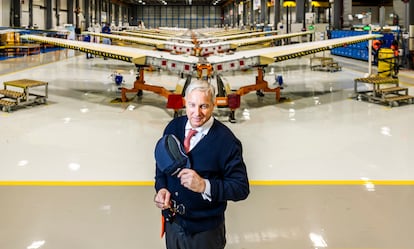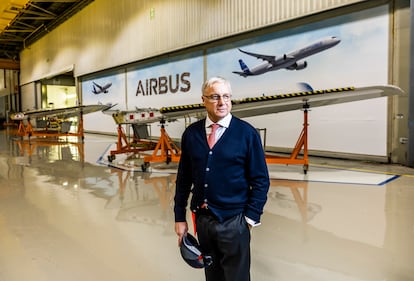Christian Scherer, CCO of Airbus: ‘More than making a profit from Boeing’s troubles, we have to draw lessons’
As head of commercial aviation at the French-based airplane manufacturer, Scherer is confident that sustainable fuels will decarbonize the sector in the short and medium-term. In a conversation with EL PAÍS, he reiterates that the first hydrogen model will be flying by 2035


After a lifetime at Airbus, German-born Christian Scherer, 61, has been the head of the commercial division of the largest aeronautical manufacturer in the world for the past couple of weeks.
He lands in office at a particularly sweet moment: 2023 was a record year for orders and deliveries. Meanwhile, the flagship model of Airbus’ main competitor for short and medium-haul flights, Boeing’s 737 MAX, is going through its umpteenth crisis.
While visiting the Airbus factory in Getafe, on the outskirts of Madrid, Scherer spoke with EL PAÍS. On the issues faced by Boeing, he emphasized: “I prohibit myself from talking about the advantages [that stem from] what’s happening [with their company].”
Question. The airline sector has recovered from the pandemic much faster than expected.
Answer. Yes, the recovery has been faster than we ourselves anticipated. There’s a human desire to travel: as soon as restrictions were lifted, international travel resumed again.
Q. Something similar happened after the Russian invasion of Ukraine: the markets severely punished Moscow’s energy sector, but the recovery has been equally rapid...
A. The conflict in Ukraine has had an impact, but the world has adapted and air traffic has recovered.
Q. You’re receiving an avalanche of orders for new planes.
A. We’re satisfied, because it speaks of the relevance of our products. It’s a phenomenon that has to do with two factors: the accelerated recovery after two years of the pandemic and the replacement of older aircraft with more efficient ones, which consume and emit less [carbon].
Q. Which factor has carried more weight?
A. The [post-pandemic] recovery, but there’s also a growing awareness among airlines regarding decarbonization. This means they’re accelerating the renewal of their fleets. Only 30% of commercial aircraft flying today are of the latest generation; the rest consume between 25% and 30% more [energy]. One of our recent successes, when compared to Boeing, is that our aircraft are more efficient and, therefore, more environmentally friendly.
Q. The problem is that, as you yourselves recognize, Airbus isn’t able to produce and deliver enough aircraft to meet demand.
A. More than a problem, it’s a frustration. In March of 2020, we had to reduce production practically by half. It was traumatic: the investment cycle was interrupted… it’s not easy to turn everything off and on again. There’s a lot of inertia. Some capabilities of our industrial ecosystem were lost in the process.
Q. Do you think you overreacted by reducing productive capacity by so much?
A. No. We had an intense internal debate and there were those who believed that it had to be reduced even more, because the drop [in demand] was enormous. If we’d produced more, we would’ve run the risk of being left with airplanes on our balance sheet.
Q. Returning to the present, the opportunity that lies ahead is enormous: the market is clearly going through a phase of prosperity.
A. Our main job now is to manage this upward curve right to the capacity limits of our supply chain. The hot spots are in engine manufacturing and cabin equipment, because many airlines aren’t only buying new aircraft, but are also improving their current fleet.
Q. Can you increase the manufacturing rate even further?
A. Today, I don’t believe so: if a single supplier fails, the entire system collapses. And our supply chain is very long and complex.

Q. Your main competitor, Boeing, is struggling.
A. Many observers say: “Christian, you’re selling like crazy and taking advantage of the situation to invade the skies and toss Boeing aside.” This isn’t the case: we manage the business in a much more serious way. The risk of making decisions with those parameters would be too high.
Q. 2024 has started very badly for them, with a new serious problem on the 737 MAX. Can Airbus take advantage of this situation for its own benefit?
A. Not in the conventional sense. What happens to Boeing is a Boeing issue, but also a reminder that safety is the most important pillar for us. It’s something non-negotiable. I don’t think we’re going to take advantage in the sense of selling more airplanes, because we’ve already sold everything. More than making a profit from this incident, we have to draw lessons.
Q. But one thing is clear: for an airline considering purchasing a Boeing 737 MAX, the most reasonable alternative is the A320. And that’s good for you.
A. Not necessarily. Any doubt about the integrity or safety of an aircraft isn’t positive. I prohibit myself from talking about advantages derived from what’s happening.
Q. Do you perceive greater interest from the airlines that, until now, have opted for Boeing planes?
A. They know that, in the short-term, we cannot satisfy demand. Even if a Boeing customer wanted to switch to Airbus, they wouldn’t be able to do so until 2030. We’re not substitutes. In that segment [short and medium-haul flights] we have a market share of two-thirds. This is a very, very strong position. Nobody has any doubts that the A320 is a very good product.
Q. Not so long ago, U.S. airlines practically only bought Boeing.
A. It’s true that, in recent years, both our presence and our [market] share in the U.S. has grown. This business is guided by commercial and financial decisions: each company opts for the most efficient and effective alternative. It’s natural that Airbus’ position of strength around the world also transfers to what’s probably the most competitive market on the planet.
Q. Much of the future of the airline sector, however, passes through China and India.
A. We’ve made a great effort to position ourselves in the largest growing market, which is India. We’re in a good position there and also in China, where, 20 years ago, we had a relatively modest position. Nowadays, we’re quite present, [we even have] an assembly line in Tianjin.
Q. China is also a source of competition. For years, Beijing has been trying to establish a large aircraft manufacturer. They seem to have found it in the Commercial Aircraft Corporation of China (COMAC).
A. Indeed, we have a new competitor. It’s legitimate that a country like China wants to increase its sovereignty in a strategic sector such as aviation: the pie is growing and it’s logical that there are more actors seeking their share. That said, the size of the ecosystem surrounding Airbus or Boeing is such that many countries or companies prefer a small part of that success, rather than a large fraction of a smaller success. This is the case in India, where some [parties] want the political glamor of having an assembly line. But there’s a smarter option available than taking the risk of becoming a direct competitor of Airbus or Boeing.
Q. You’re not afraid, then, of new competition.
A. No. It’s positive, because it forces us to maintain a high level of excellence and technological advancement. COMAC, for example, hasn’t put anything new on the table: same engines, same avionics, same basic architecture…
Q. But at a lower price.
A. The question is whether the world is going to want to buy a cheaper plane from yesterday, when an Airbus comes with new technology and allows for a reduction in energy consumption by nearly 25%.
Q. The airline sector is one of the most difficult to decarbonize. How can this be done?
A. 70% of the world’s fleet is still from previous generations. Equipping themselves with the best [technology] available is what airlines are doing.
Q. But that won’t be enough.
A. No, it won’t be. Today, unlike three years ago, I believe that an important part [of decarbonization] will be done via sustainable aviation fuels (SAFs).
Q. Do you see this as a bridge to hydrogen-powered planes?
A. Yes, a big bridge. It’ll be more than half of the medium-term solution, because an aircraft is a 25-year-long investment and it will take more than two decades to replace those that are flying today, which can already operate with SAFs. And there’s something else that we can improve: we live in a digital world, but air traffic management still suffers from many inefficiencies. We still fly in zigzags, constantly going up and down... just like 70 years ago. Improving that would reduce fuel consumption by 10%.
Q. Three years ago, Airbus announced that the first commercial aircraft powered by hydrogen would be flying by 2035. Will you keep that promise?
A. Yes, absolutely.
Sign up for our weekly newsletter to get more English-language news coverage from EL PAÍS USA Edition
Tu suscripción se está usando en otro dispositivo
¿Quieres añadir otro usuario a tu suscripción?
Si continúas leyendo en este dispositivo, no se podrá leer en el otro.
FlechaTu suscripción se está usando en otro dispositivo y solo puedes acceder a EL PAÍS desde un dispositivo a la vez.
Si quieres compartir tu cuenta, cambia tu suscripción a la modalidad Premium, así podrás añadir otro usuario. Cada uno accederá con su propia cuenta de email, lo que os permitirá personalizar vuestra experiencia en EL PAÍS.
¿Tienes una suscripción de empresa? Accede aquí para contratar más cuentas.
En el caso de no saber quién está usando tu cuenta, te recomendamos cambiar tu contraseña aquí.
Si decides continuar compartiendo tu cuenta, este mensaje se mostrará en tu dispositivo y en el de la otra persona que está usando tu cuenta de forma indefinida, afectando a tu experiencia de lectura. Puedes consultar aquí los términos y condiciones de la suscripción digital.








































